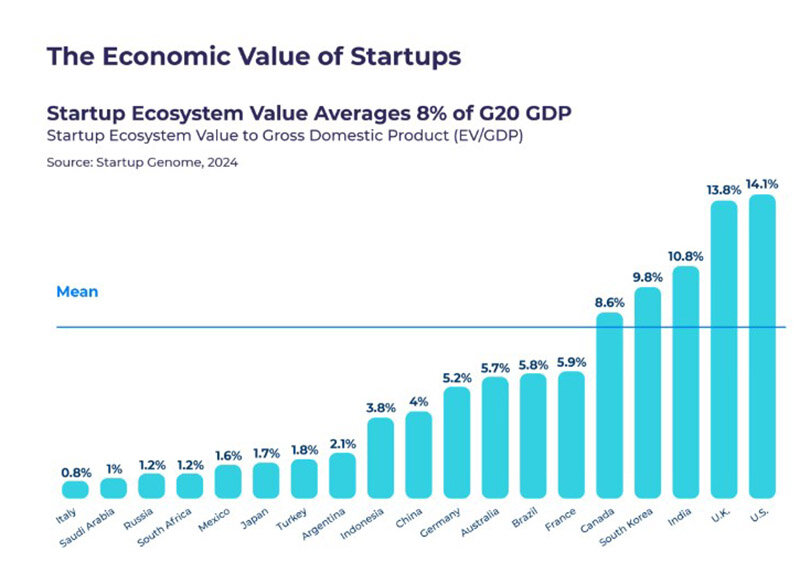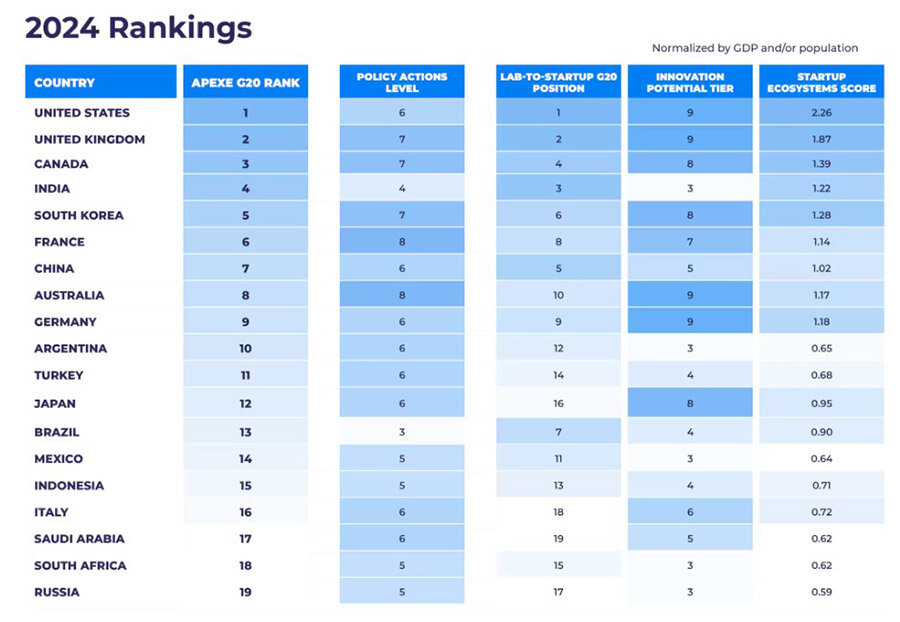Вusiness / Investments / Analytics / Research / Ratings / USA / United Kingdom / Canada / France / China / Germany / Turkey / Japan / Italy / Russia 11.06.2025
How Startup Support Drives Economic Growth: Global Ranking by the World Economic Forum

The World Economic Forum has published the APEXE ranking (Accelerating Performance of Ecosystem Excellence), developed in partnership with Startup Genome and the Global Entrepreneurship Network. The study assesses how effectively G20 countries convert their innovation potential into sustainable startup ecosystems.
A Tool for Policymakers
The APEXE ranking is designed for ministries and agencies responsible for entrepreneurship and technology development. The methodology revolves around three core questions: What is the innovation potential? What are the actual results? How efficiently is one transformed into the other? The evaluation includes patent production, education levels, macroeconomic indicators, business environment, and regulatory conditions. Policy measures are assessed using a model based on data from 85 ecosystems across 45 countries.
The report helps identify where efficiency is lost and where policies require adjustments. It relies on two key indicators: Lab-to-Startup Conversion and Policy Action Scorecard. The first shows how successfully scientific research is translated into market-ready projects, while the second evaluates recent government actions and helps forecast future development.
Measuring Ecosystem Value
The Ecosystem Value (EV) — or the combined value of all active startups in a country — relative to GDP (EV/GDP), serves as the main metric for cross-country comparison. It measures how effectively an economy leverages innovation to create market value.
Among G20 countries, the average EV-to-GDP ratio stands at 8%, but differences between countries are significant. The United States leads with 14.1%, followed by the United Kingdom (13.8%) and India (10.8%). South Korea posts 9.8%, emerging as one of the few countries outperforming its innovation potential thanks to aggressive government support, placing fifth in Lab-to-Startup Conversion.
Canada stands at 8.6%, France at 5.9%. Brazil, despite limited scientific resources, ranks seventh in conversion with 5.8%. Germany follows with 5.2%, while China, Indonesia, Argentina, Turkey, and Japan trail behind. Russia (1.2%) and South Africa (1%) sit at the bottom, with Italy posting the lowest score of 0.8%. According to the report, if lower-performing countries could raise their EV/GDP to the G20 average, the global startup economy could expand by $2.7 trillion.

Startups as Engines of Growth
The report highlights that startup ecosystems have become crucial drivers of economic growth. Countries that began investing in these ecosystems in the 1990s are now reaping long-term benefits, while latecomers face systemic challenges. In an era of technological shifts and global competition, delays may cost economies not only jobs but also strategic market positions.
The Final APEXE Ranking
The United States tops the APEXE ranking, leading both in Lab-to-Startup Conversion and total ecosystem score (2.26), despite having only moderate government initiatives. The United Kingdom and Canada follow in second and third place, thanks to a balanced mix of policy, potential, and market activity. India ranks fourth, though its innovation potential remains lower than the top leaders. South Korea holds fifth place.
Next come France, China, Australia, and Germany, with Argentina rounding out the top ten. Japan ranks 12th despite its advanced scientific base. Brazil ranks 13th, while Indonesia and Mexico occupy mid-tier positions with moderate individual results. Analysts note that some Latin American and African countries show high Lab-to-Startup Conversion due to flexible regulations and strong entrepreneurial culture, rather than patent quantity.
At the bottom are Italy, Saudi Arabia, and South Africa. Russia ranks last overall (0.59), posting some of the lowest scores in conversion and startup policy quality.

Policy as a Game Changer
Experts emphasize that targeted funding and specific initiatives can quickly improve a country's position in global rankings. Sustainable startup ecosystems require consistent reforms: removing administrative barriers, introducing effective incentives, and supporting innovation clusters. Successful countries invest in acceleration programs, technology transfer, and close cooperation between science and business. As a result, startups become the backbone of economic growth and global competitiveness.
Подсказки: startup ecosystem, APEXE, World Economic Forum, G20, innovation, economic growth, startups, entrepreneurship, policy, technology, global ranking








